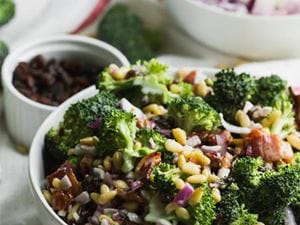
My husband teases me, because I cannot seem to remember movies. Even if I’ve seen a movie multiple times, I can’t recall the famous scenes or quotes everyone else repeats effortlessly. Usually it takes me at least thirty minutes of watching a movie again to remember I even saw it in the first place.
But meals? Meals I remember.
I remember the spaghetti dinner my family ate every week while I was growing up and the summer salads my mom made when we hosted guests. I remember the custard our neighbor dropped off for my mom when she was sick with cancer, and I remember the breakfast my family ate the morning she passed away. I remember the pot roast a friend cooked after I had a baby and the tacos another friend brought a few weeks ago “just because.”
Meals can be memorable—sometimes because of the quality or the uniqueness of the food itself. But often, we remember meals because they point to something bigger. Meals tell a story. They remind us of life experiences, of people, even of what God’s done and who he is.
God told the Israelites to use meals this way, and in Exodus, we find instructions for one of the most important meals in Scripture.
In Exodus 12, God commanded the Israelites to spread blood on their door frames and eat a unique meal, Passover. At twilight on the day the LORD commanded, they were to kill a perfect, year-old lamb, spread its blood on the two doorposts and lintel of their houses (12:6-7), and roast it over the fire. They were to then eat it along with bitter herbs and bread made without yeast, all while wearing clothes and sandals, ready for travel (12:11). Their obedience demonstrated faith in Yahweh and belief in his promise to pass over their houses, spare their firstborn, and deliver them from the hand of Pharaoh.
The people of Israel did as they were commanded (12:28). That very night, the LORD struck down the firstborn of every household in Egypt but passed over the houses covered by the blood of the lamb. Egypt wailed; Israel left. God brought his people out of slavery, beginning their journey to the Promised Land.
Why did God tell Israel to observe a meal and give such specific instructions about what to eat and how to eat it? He commanded the people to eat the Passover not just that night but perpetually as a reminder. Exodus 12:14 says, “This day shall be for you a memorial day, and you shall keep it as a feast to the LORD; throughout your generations, as a statute forever, you shall keep it as a feast.”
Passover, and the seven-day Feast of Unleavened Bread that eventually followed, provided a liturgy of the table. It created intentional time and space to remember God’s deliverance. The meal itself embodied the memory. When you ate the meal, you couldn’t help but recall the events of the first Passover. The very food and manner in which it was consumed rehearsed the night God delivered his people from slavery. It uniquely told—and still tells—the story of who God is, what he did, and who his people are to be.
When children asked why they observed this feast, parents were to say, “It is because of what the LORD did for me when I came out of Egypt” (Exodus 13:8). Generation after generation would know Yahweh and remember what he did, because “what is not carefully remembered by a community is very naturally and easily forgotten.”
N.T. Wright said of Passover, “The whole meal seemed to say in a hundred different ways: this is who we are. This is who we were. This is who we will be. And coming through all of it like the strange music of the story: this is who God was, and is, and will be.”
Our meals can do the same. We look back on the Passover meal and celebrate what God did for Israel, and then what he did for us through Christ. Our primary meal of remembrance as Christians is communion. We pause on a regular basis as a Church to eat and drink as Jesus told us to do, “in remembrance of me” (Lk 22:19).
But we also practice remembering who God is and what he’s done on a daily basis, at our everyday tables.
Practicing remembrance at the table can come through everything from simple conversations, teaching catechisms, or commemorating special events and holidays. We can make specific dishes that serve as “Ebenezers” in our home, symbols that remind us “the LORD has helped us” (1 Sam. 7:12). We can begin a meal by reading a remembrance psalm such as Psalm 105, or even write our own family psalm. We can cultivate traditions that remind us of people, experiences, and how we’ve seen God work. Like with the Passover meal, even the food we eat and the way we eat it can tell a story of the character and work of God in our lives.
However we do it, the point is that we need to continue to remind ourselves and each other of who God is, what he’s done, and who he’s called us to be. We need to gather around the table, to share our stories and our food, to listen and learn from one another. We need to pull up chairs and say, “Come and hear, all you who fear God, and I will tell what he has done for my soul” (Ps. 66:16).
The table provides one of the best places to tell the story of God’s work in the life of his people. May we be people who tell those stories again and again and again.
(Paleo) Summer Broccoli Salad
Yields about 8 servings
This is an adaptation of the broccoli salad my mom always made, especially when we had guests over for a cookout or picnic. It reminds me of her, of family, and of sweet summers around the table.
16 ounces broccoli florets (about 5.5-6 cups)
12 ounces bacon, chopped and cooked until crisp
½ cup chopped red onion
½ cup raisins
½ cup pine nuts or sunflower seeds
¾ cup mayonnaise
2-3 Tablespoons honey (I used 2)
2 Tablespoons apple cider vinegar
Freshly ground black pepper
Add the broccoli, cooked bacon, onion, raisins, and pine nuts to a large bowl.
In a separate bowl, whisk together the mayo, honey, and vinegar. Pour the dressing over the rest of the ingredients and toss well. Season with freshly ground black pepper to taste.
You can serve this salad immediately, but it’s best if you let it sit in the fridge for a couple hours. Just give it a good stir when you’re ready to serve, as the dressing can gather at the bottom.
Enjoy!
Sarah J. Hauser is a writer and speaker living in the Chicago suburbs with her husband and three kids. She shares biblical truth (and the occasional recipe) to nourish the soul. Sarah loves cooking but rarely follows a recipe exactly, and you can almost always find her with a cup of coffee in hand. Find her at sarahjhauser.com or on Instagram (@sarah.j.hauser), and don't miss her monthly newsletter.
8/10/2021 7:59:17 PM





